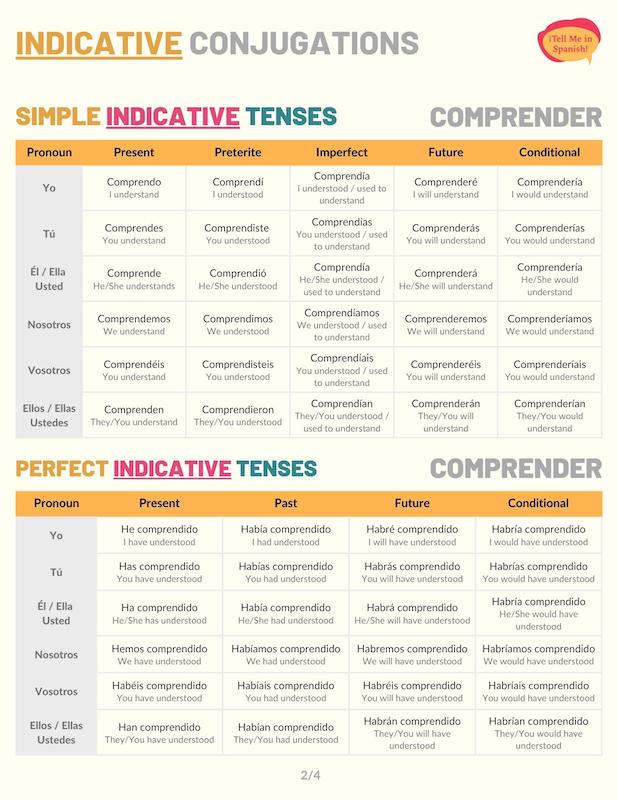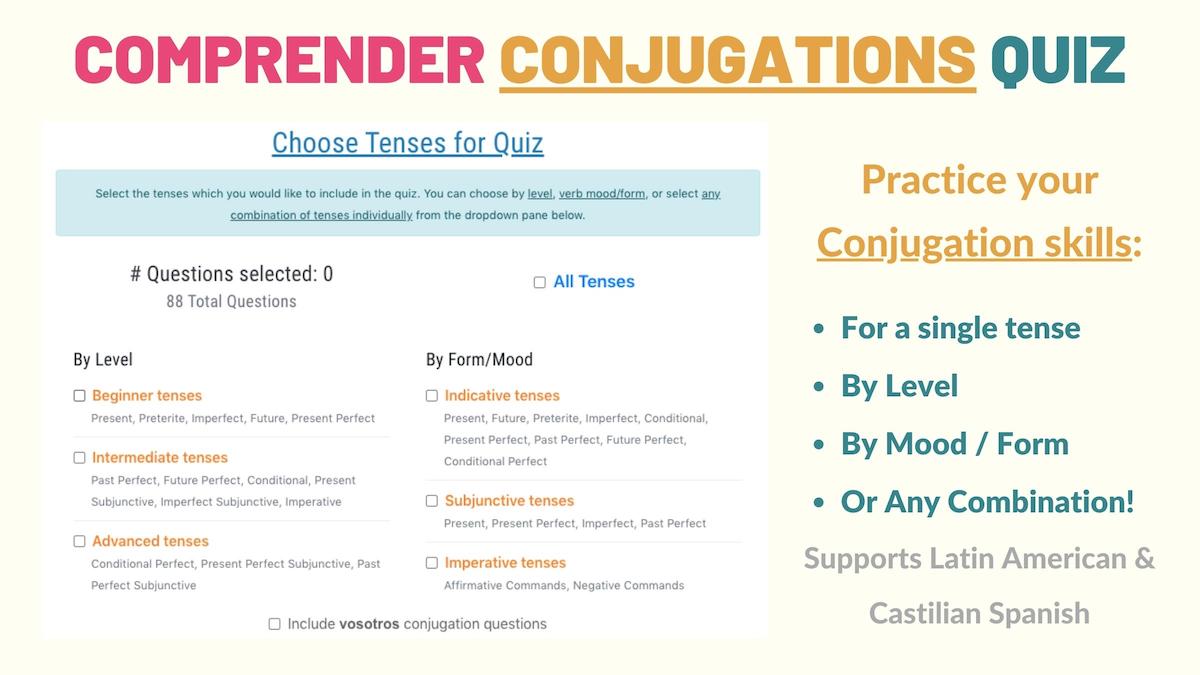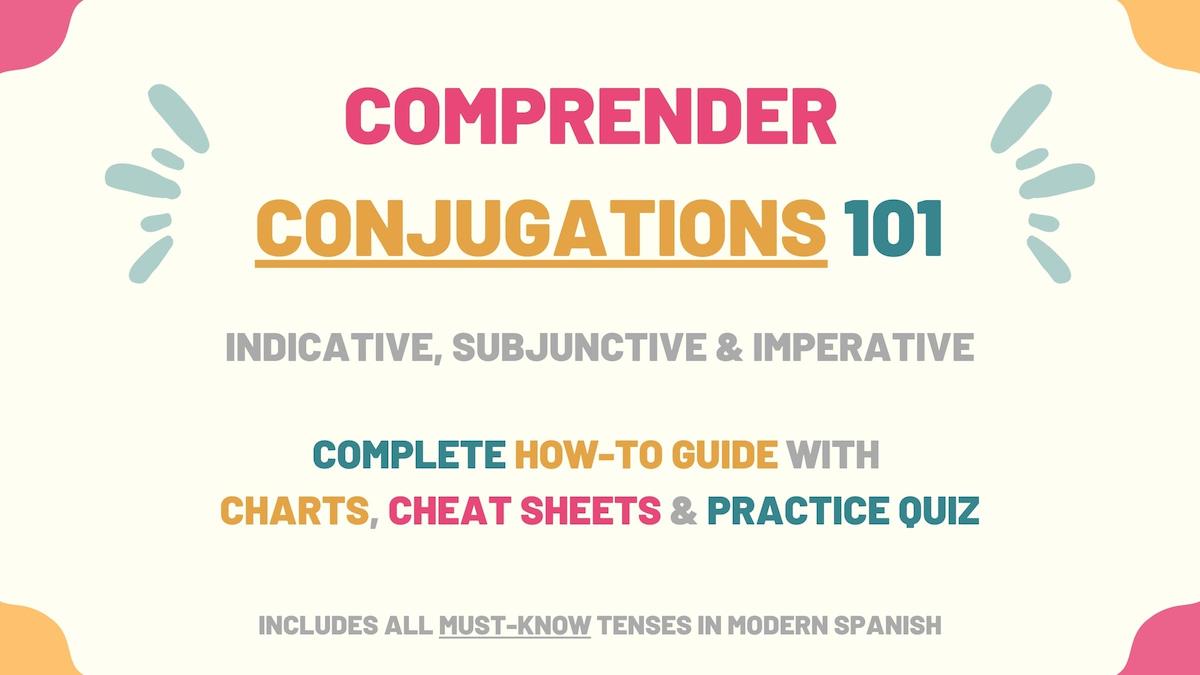On top of being a basic verb, comprender conjugation patterns can help you practice the -ER regular conjugation. So, in this guide, we’ll learn how to conjugate comprender in the most common Spanish tenses. Here is what we’ll cover:
- Comprender Overview
- Indicative Tenses of Comprender Conjugations
- Subjunctive Tenses of Comprender Conjugations
- Imperative (Commands) of Comprender Conjugations
- Uses & Examples
- Download Comprender Conjugation Tables & Uses Cheat sheets
- Comprender Conjugation Practice Quiz
The tenses we cover in this guide are the only ones you need to know. While there are more conjugation tenses, they are not used in contemporary Spanish and therefore are obsolete.
Overview of Comprender
Indicative Conjugations of Comprender
Present tense
The present tense conjugations of comprender are used to talk about the things people currently understand. For example: Yo no comprendo el pretérito muy bien.
| Person | Conjugation | Translation |
|---|---|---|
| Yo | Comprendo | I understand |
| Tú | Comprendes | You understand |
| Él / Ella Usted | Comprende | He/She understands You (formal) understand |
| Nosotros | Comprendemos | We understand |
| Vosotros | Comprendéis | You understand |
| Ellos / Ellas Ustedes | Comprenden | They understand You (plural) understand |
Preterite tense
Comprender preterite conjugations refer to the things someone understood. This past tense can use time markers that point to a specific moment in the past. ¿Comprendieron lo que les dije?
| Person | Conjugation | Translation |
|---|---|---|
| Yo | Comprendí | I understood |
| Tú | Comprendiste | You understood |
| Él / Ella Usted | Comprendió | He/She understood You (formal) understood |
| Nosotros | Comprendimos | We understood |
| Vosotros | Comprendisteis | You understood |
| Ellos / Ellas Ustedes | Comprendieron | They understood You (plural) understood |
Imperfect tense
Use comprender past imperfect forms to talk about things you understood or didn’t understand for a long period of time in the past. For instance: Sara no comprendía las matemáticas.
| Person | Conjugation | Translation |
|---|---|---|
| Yo | Comprendía | I understood I used to understand |
| Tú | Comprendías | You understood You used to understand |
| Él / Ella Usted | Comprendía | He/She understood He/She used to understand You (formal) understood You (formal) used to understand |
| Nosotros | Comprendíamos | We understood We used to understand |
| Vosotros | Comprendíais | You understood You used to understand |
| Ellos / Ellas Ustedes | Comprendían | They understood They used to understand You (plural) understood You (plural) used to understand |
Near future
The Spanish immediate future of ‘comprender’ is formed with ir (present tense) + a + comprender and can be translated as “going to understand”. Use these conjugations to express that someone is going to understand something soon in the future. Algún día vas a comprender.
| Person | Conjugation | Translation |
|---|---|---|
| Yo | Voy a comprender | I’m going to understand |
| Tú | Vas a comprender | You’re going to understand |
| Él / Ella Usted | Va a comprender | He/She is going to understand You (formal) are going to understand |
| Nosotros | Vamos a comprender | We’re going to understand |
| Vosotros | Vais a comprender | You’re going to understand |
| Ellos / Ellas Ustedes | Van a comprender | They’re going to understand You (plural) are going to understand |
Future simple tense
Conjugate comprender to the future tense to say that someone will understand something at some point in the future. For example: Samantha está enojada, pero ya comprenderá.
| Person | Conjugation | Translation |
|---|---|---|
| Yo | Comprenderé | I will understand |
| Tú | Comprenderás | You will understand |
| Él / Ella Usted | Comprenderá | He/She will understand You (formal) will understand |
| Nosotros | Comprenderemos | We will understand |
| Vosotros | Comprenderéis | You (formal) will understand |
| Ellos / Ellas Ustedes | Comprenderán | They will understand You (plural) will understand |
Conditional tense
The conditional conjugations of ‘comprender’ refers to things or situations that someone would understand. For example: Creí que tú comprenderías.
| Person | Conjugation | Translation |
|---|---|---|
| Yo | Comprendería | I would understand |
| Tú | Comprenderías | You would understand |
| Él / Ella Usted | Comprendería | He/She would understand You (formal) would understand |
| Nosotros | Comprenderíamos | We would understand |
| Vosotros | Comprenderíais | You would understand |
| Ellos / Ellas Ustedes | Comprenderían | They would understand You (plural) would understand |
Present perfect tense
Haber in the present tense + comprendido (past participle) is the formula to conjugate the Spanish present perfect tense. These ‘comprender’ conjugations are used to talk about the things people have or haven’t understood. No has comprendido lo que quiero decir.
| Person | Conjugation | Translation |
|---|---|---|
| Yo | He comprendido | I have understood |
| Tú | Has comprendido | You have understood |
| Él / Ella Usted | Ha comprendido | He/She has understood You (formal) have understood |
| Nosotros | Hemos comprendido | We have understood |
| Vosotros | Habéis comprendido | You have understood |
| Ellos / Ellas Ustedes | Han comprendido | They have understood You (plural) have understood |
Past perfect
Conjugate comprender to the Spanish past perfect tense to express that someone had or hadn’t understood something before some other reference point in the past. Creí que ya habían comprendido. To form the past perfect, use the imperfect form of ‘haber’ and the past participle form of ‘comprender’.
| Person | Conjugation | Translation |
|---|---|---|
| Yo | Había comprendido | I had understood |
| Tú | Habías comprendido | You had understood |
| Él / Ella Usted | Había comprendido | He/She had understood You (formal) had understood |
| Nosotros | Habíamos comprendido | We had understood |
| Vosotros | Habíais comprendido | You had understood |
| Ellos / Ellas Ustedes | Habían comprendido | They had understood You (plural) had understood |
Future perfect
Comprender to the future perfect tense expresses that someone will have understood something by or before a certain time in the future. These conjugations are also used to express that a person might have understood something. For instance: En unas horas, habré comprendido lo que me dijiste.
| Person | Conjugation | Translation |
|---|---|---|
| Yo | Habré comprendido | I will have understood |
| Tú | Habrás comprendido | You will have understood |
| Él / Ella Usted | Habrá comprendido | He/She will have understood You (formal) will have understood |
| Nosotros | Habremos comprendido | We will have understood |
| Vosotros | Habréis comprendido | You will have understood |
| Ellos / Ellas Ustedes | Habrán comprendido | They will have understood You (plural) will have understood |
Conditional perfect
The conditional perfect conjugations of comprender are used to convey that someone would have understood something as long as a past condition had been met. For instance: Si me hubieran puesto atención, habrían comprendido lo que dije.
| Person | Conjugation | Translation |
|---|---|---|
| Yo | Habría comprendido | I would have understood |
| Tú | Habrías comprendido | You would have understood |
| Él / Ella Usted | Habría comprendido | He/She would have understood You (formal) would have understood |
| Nosotros | Habríamos comprendido | We would have understood |
| Vosotros | Habríais comprendido | You would have understood |
| Ellos / Ellas Ustedes | Habrían comprendido | They would have understood You (plural) would have understood |
Progressive tenses
The progressive tenses of comprender convey that someone is understanding something at the moment of speaking. Or, in the case of past tenses (preterite and imperfect), to communicate that a past action was in progress when someone understood something.
For instance: Apenas estaba comprendiendo y me confundiste.
| Progressive Tense | Formula | Translation Example |
|---|---|---|
| Present | Estar (present) + comprendiendo | I am understanding |
| Preterite | Estar (preterite) + comprendiendo | You were understanding |
| Imperfect | Estar (imperfect) + comprendiendo | He was understanding |
| Future | Estar (future) + comprendiendo | We will be understanding |
| Conditional | Estar (conditional) + comprendiendo | They would be understanding |
Comprender Subjunctive Conjugations
The Spanish subjunctive mood is used to talk about wishes, doubts, requests, or hypothetical situations. Below are the comprender conjugation charts for the subjunctive tenses.
Present subjunctive
Comprender subjunctive conjugations are regular. You can use these forms to request or hope that someone understands something. For instance: Espero que me comprendas.
| Person | Conjugation | Translation |
|---|---|---|
| Yo | Comprenda | I understand |
| Tú | Comprendas | You understand |
| Él / Ella Usted | Comprenda | He/She understands You (formal) understand |
| Nosotros | Comprendamos | We understand |
| Vosotros | Comprendáis | You understand |
| Ellos / Ellas Ustedes | Comprendan | They understand You (plural) understand |
Present perfect subjunctive
Haber in the present subjunctive + comprendido is the formula to build the present perfect subjunctive of ‘comprender’. When using this tense, ‘comprender’ expresses doubt about someone understanding something. No creo que los chicos hayan comprendido.
| Person | Conjugation | Translation |
|---|---|---|
| Yo | Haya comprendido | I have understood |
| Tú | Hayas comprendido | You have understood |
| Él / Ella Usted | Haya comprendido | He/She has understood You (formal) have understood |
| Nosotros | Hayamos comprendido | We have understood |
| Vosotros | Hayáis comprendido | You have understood |
| Ellos / Ellas Ustedes | Hayan comprendido | They have understood You (plural) have understood |
Imperfect subjunctive
The imperfect subjunctive conjugations of ‘comprender’ refer to past suggestions, requests, wishes or expectations you had about someone understanding something. Esperaba que ustedes me comprendieran.
The imperfect subjunctive has two conjugation models depending on which type of Spanish you’re using:
Latin American Spanish version
| Person | Conjugation | Translation |
|---|---|---|
| Yo | Comprendiera | I understood |
| Tú | Comprendieras | You understood |
| Él / Ella Usted | Comprendiera | He/She understood You (formal) understood |
| Nosotros | Comprendiéramos | We understood |
| Ellos / Ellas Ustedes | Comprendieran | They understood You (plural) understood |
Note: In Latin American Spanish, vosotros is not used. As a result, the conjugation chart above doesn’t contain this pronoun.
Castilian Spanish version
| Person | Conjugation | Translation |
|---|---|---|
| Yo | Comprendiese | I understood |
| Tú | Comprendieses | You understood |
| Él / Ella Usted | Comprendiese | He/She understood You (formal) understood |
| Nosotros | Comprendiésemos | We understood |
| Vosotros | Comprendieseis | You understood |
| Ellos / Ellas Ustedes | Comprendiesen | They understood You (plural) understood |
Past perfect subjunctive
In the past perfect subjunctive, comprender expresses that someone would have understood something if a past circumstance was met. Additionally, these conjugations also refer to regrets or hypothetical results if someone had understood something.
For example: Si hubieras comprendido, no habríamos tenido tantos problemas.
| Person | Conjugation | Translation |
|---|---|---|
| Yo | Hubiera comprendido | I had understood |
| Tú | Hubieras comprendido | You had understood |
| Él / Ella Usted | Hubiera comprendido | He/She had understood You (formal) had understood |
| Nosotros | Hubiéramos comprendido | We had understood |
| Vosotros | Hubierais comprendido | You had understood |
| Ellos / Ellas Ustedes | Hubieran comprendido | They had understood You (plural) had understood |
Comprender Imperative Conjugations
The Spanish imperative mood are the conjugations you must use to give orders.
Affirmative commands
To order people to understand something, use the affirmative commands of ‘comprender’. For instance: Señora, comprenda que no la puedo ayudar.
| Person | Conjugation | Translation |
|---|---|---|
| Tú | Comprende | Understand |
| Usted | Comprenda | Understand |
| Vosotros | Comprended | Understand |
| Ustedes | Comprendan | Understand |
Negative commands
The negative imperative of ‘comprender’ can be used to order people to not understand something. However, sentences with these conjugations are not as common because you cannot command people’s understanding.
| Person | Conjugation | Translation |
|---|---|---|
| Tú | No comprendas | Don’t understand |
| Usted | No comprenda | Don’t understand |
| Vosotros | No comprendáis | Don’t understand |
| Ustedes | No comprendan | Don’t understand |
Meanings of Comprender & Examples
Since you now know how to conjugate comprender in Spanish, here are some examples of how to use this verb.
[Comprender conjugated] + [complement]
¿Comprenden lo que quiero decir?
Do you guys understand what I mean?
Sally nunca comprendió tus razones.
Sally never understood your reasons.
When talking about understanding a person, you can combine ‘comprender’ with direct object pronouns:
Comprendéme, tengo mucho trabajo.
Understand me, I have a lot of work.
Take Note: Comprender is a slightly more formal synonym of the verb entender.
Download Comprender Conjugation Tables & Uses Cheat sheets

Click the button below to download the cheat sheets PDF I’ve assembled with all of the comprender conjugation charts, meanings, and uses so you can study them at your own pace.
Practice Quiz: Comprender Conjugation

The best way to commit all the tense conjugations to memory for a verb you’ve just learned is to practice and use them. That’s why I’ve created a comprender conjugation practice quiz.



